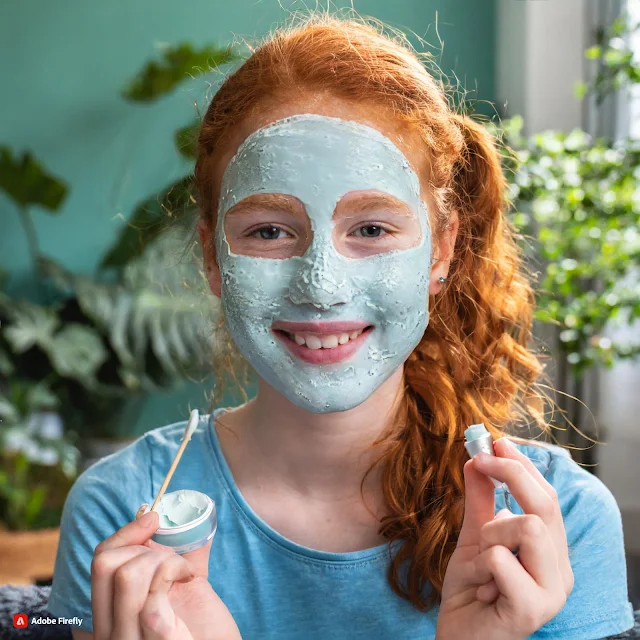Teens frequently struggle with the conundrum of controlling dry patches while fighting acne. It's not only about looks; this is also about confidence and contentment with who you are. For teenagers dealing with this twin dilemma, our site is your go-to source for deciphering the mysteries of skincare. To assist you attain cleaner, more radiant skin, we'll present you advice, tricks, and a skincare regimen.
 |
Your road map to bright, clear skin and boosted self-esteem is this blog article. We'll dispel popular misconceptions about skincare, provide professional guidance, and offer doable solutions you can quickly implement into your everyday regimen. This information is priceless, whether you're a parent supporting your child's skincare journey or an adolescent looking for solutions.
Are you prepared to start this thrilling skincare journey? Let's begin by dissecting the keys to attaining radiant and healthy skin during your teenage years.
Understanding Teenage Skin
Teenage skin is distinct and constantly changing because of the various hormonal changes that take place throughout this phase of life. Teens who are aware of these traits will be better able to manage their skincare regimens. Here are some things to think about:- Hormonal Changes: Significant hormonal changes that occur during adolescence cause an increase in oil production, which can exacerbate acne.
- Sensitive Skin: Adolescent skin is particularly susceptible to irritation from harsh products due to its increased sensitivity.
- Skin Renewal: Teenagers have a quicker rate of skin cell turnover, which may cause acne and clogged pores.
- Balancing Act: Teens must find a way to keep their skin from getting too dry while still controlling their oiliness.
Causes of Dry and Acne-Prone Skin
Understanding the root causes of dryness and acne is crucial for effective skincare. Several factors can contribute to these issues:
- Hormones: Hormonal fluctuations during adolescence can increase sebum (oil) production, contributing to acne. On the other hand, these hormones can also affect skin hydration.
- Genetics: Your family history plays a role in your skin's tendency toward dryness or acne.
- Environmental Factors: External factors like weather, pollution, and lifestyle can impact your skin's health.
- Diet and Hydration: Your diet and water intake can influence your skin's condition.
Skincare Basics
Establishing a solid skincare routine is the foundation for managing both dryness and acne in teenage skin. Here are some fundamental essentials to consider:
- Cleansing: Use a gentle, non-comedogenic cleanser to remove dirt, excess oil, and makeup without over-drying the skin.
- Moisturizing: Even if you have oily skin, moisturizing is crucial to maintain skin hydration. Opt for a lightweight, non-comedogenic moisturizer.
- Sun Protection: Apply sunscreen daily to protect your skin from the sun's harmful UV rays. Some acne treatments can make the skin more sensitive to sunlight.
- Product Selection: Look for products with ingredients like salicylic acid, benzoyl peroxide, and hyaluronic acid, as they can help manage acne and maintain skin moisture.
 |
| Choosing the right product |
Acne Treatment
Acne can be a persistent and frustrating issue for many teenagers. Here's a more detailed look at how to effectively address and manage acne:
- Over-the-counter Solutions: Start with over-the-counter acne products containing ingredients like benzoyl peroxide or salicylic acid. These can help reduce inflammation and prevent clogged pores. Be patient; it may take several weeks to see noticeable results.
- Prescription Treatments: If your acne is severe or not improving with over-the-counter treatments, consult a dermatologist. They can prescribe stronger medications, such as topical retinoids or oral antibiotics, to target acne at its source.
- Skincare Routine: Implement a consistent skincare routine specifically tailored to acne-prone skin. This should include a gentle cleanser, non-comedogenic moisturizer, and acne-fighting treatments. Avoid harsh scrubs that can irritate the skin.
- Lifestyle Factors: Lifestyle choices also play a role in acne management. Pay attention to your diet, as certain foods, especially those high in sugars and dairy, can exacerbate acne. Also, try to manage stress, as it can trigger or worsen acne breakouts.
Dry Skin Relief
Dry skin can be uncomfortable and contribute to acne if not properly addressed. Consider these strategies for relief:
- Hydrating Products: Choose moisturizers with ingredients like hyaluronic acid, glycerin, or ceramides to lock in moisture. Apply them to damp skin to trap the most hydration.
- Avoid Irritants: Steer clear of products with alcohol, fragrances, and harsh ingredients that can further dry out your skin.
- Humidifiers: Use a humidifier in your room, especially during dry seasons, to add moisture to the air and prevent further skin dryness.
- Lukewarm Showers: Hot showers may feel soothing, but they can strip your skin of essential oils. Opt for lukewarm water instead and limit shower time to 10-15 minutes.
Read more || Clean Skincare for Teens - 25 Essentials for Radiant Skin
Diet and Lifestyle
Your diet and lifestyle have a significant impact on your skin's health. Here's a more detailed exploration of these factors:
- Balanced Diet: Consume a balanced diet rich in fruits, vegetables, lean proteins, and whole grains. Antioxidant-rich foods can help fight inflammation, while adequate protein supports skin repair.
- Hydration: Drink plenty of water to keep your skin and body well-hydrated. Water helps flush toxins and maintain healthy skin.
- Limit Sugar and Dairy: Some studies suggest that high-sugar and high-dairy diets may exacerbate acne. Consider reducing your intake and monitoring how your skin responds.
- Exercise: Regular exercise improves circulation and can help maintain healthy skin. Sweating can also clear out your pores, just be sure to cleanse your skin after working out to avoid breakouts.
- Stress Management: High stress levels can trigger acne breakouts. Incorporate stress-reduction techniques into your daily routine, such as mindfulness, meditation, or yoga.
Tips for Consistency
Consistency is crucial in maintaining healthy skin. Here are some actionable tips to ensure you stick to your skincare routine:
- Set a Schedule: Establish a daily routine and set specific times for your skincare regimen. Consistency makes it a habit.
- Keep Products Accessible: Store your skincare products where you can easily access them. This makes it more likely that you'll use them consistently.
- Track Progress: Take photos of your skin's progress over time. This visual record can be motivating and help you see the benefits of your routine.
- Involve a Support System: Enlist the support of friends or family to help you stay on track. Share your skincare journey with someone who can help keep you accountable.
Conclusion: Confidence through Clear Skin
You will acquire the skills and information necessary to take care of your particular skin as a result of your trip through teen skincare for dry and acne-prone skin. Your skin is a major medium through which you express who you are throughout this period of self-discovery in adolescence.
You now know all about the nuances of your skin, know what causes acne and dryness, and know the fundamentals of a good skincare regimen. With this information at your disposal, you may take care of acne, treat dry skin, lead a sensible lifestyle, and stay consistent.
As you proceed, never forget that your skin is just as distinct as you are. Your skincare journey is about more than simply glowing skin—it's about confidence building. You possess the ability to unleash the potential of your skin and allow your inner brightness to be seen in your radiant, clear complexion.
Accept the journey of teen skincare for skin that is dry and prone to acne, and face the world with confidence. This is something you can handle!
FAQ's
1. What skincare is good for dry acne-prone skin?
For dry acne-prone skin, it's essential to strike a balance. Look for gentle, hydrating products that won't exacerbate dryness but are non-comedogenic to prevent clogged pores. Ingredients like hyaluronic acid and glycerin can help retain moisture while avoiding alcohol and harsh products.
2. What should a 13-year-old's skincare routine be?
A simple skincare routine for a 13-year-old should include cleansing with a mild, non-comedogenic cleanser, moisturizing with a lightweight, non-comedogenic moisturizer, and applying sunscreen daily. If they have acne, consider adding an over-the-counter acne treatment with ingredients like salicylic acid or benzoyl peroxide, but consult a dermatologist for personalized advice.
3. Is salicylic acid OK for 13-year-olds?
Salicylic acid can be suitable for 13-year-olds, but it should be used in moderation and as part of a well-balanced skincare routine. If your child is experiencing acne, consider starting with a lower concentration and monitoring their skin's response. If there are concerns, consult a dermatologist.
4. Can a 13-year-old use vitamin C serum?
Vitamin C serums can be beneficial for the skin, but it's essential to choose the right product and use it cautiously. Ensure that the vitamin C serum is formulated for sensitive skin and does not cause irritation. Consult a dermatologist or skincare professional for personalized advice.
5. Does dry skin affect pimples?
Yes, dry skin can affect pimples. Dryness can lead to increased sensitivity and potential irritation. It's crucial to simultaneously address dryness and acne concerns with a skincare routine that provides hydration without clogging pores.
6. Which moisturizer is best for acne and dry skin?
The best moisturizer for acne and dry skin is one that is non-comedogenic, meaning it won't clog pores. Look for a moisturizer that contains ingredients like hyaluronic acid or ceramides to provide hydration without exacerbating acne.
7. Why is my skin so dry and acne?
Dry and acne-prone skin can result from hormonal changes, genetics, environmental factors, and a lack of proper skincare. Hormonal fluctuations during adolescence can lead to both increased oil production (acne) and skin dryness. It's crucial to address both aspects of your skincare routine to achieve balance.








0 Comments